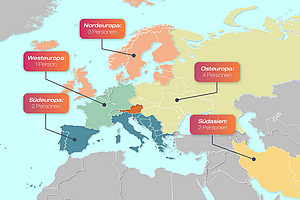Deaf Migrants in Austria: Semiotic Repertoires and Languaging Practices
Research project 2020-2024 (ongoing dissemination)
Deaf migrants are faced with many linguistic and social challenges, but also exhibit a unique communicative potential. By means of semi-structured interviews conducted by a deaf ÖGS signer, the research project explores the language background and current languaging practices of deaf migrants in Styria/Austria.
Team: Julia Gspandl, Claudia Dobner, Christian Stalzer, Fabian Dominikus
We are grateful for research funding from the City of Graz (Bildung und Integration) and Verein spi:k.
Our project explores the unique semiotic repertoires and languaging practices of deaf migrants in Austria. We want to know:
- What are the participants’ languaging practices and strategies?
- How successful is their languaging according to their own and others' assessments?
- Which aspects of their linguistic backgrounds may influence their current repertoires, practices and competencies?
12 semi-structured interviews with deaf migrants in Graz/Austria were carried out by a deaf signer of Austrian Sign Language (ÖGS) and are analyzed using ELAN and MaxQDA for their content as well as the languaging practices observed during the interview, including functional (general) and formal (ÖGS) ratings of signing competence by 2 deaf ÖGS signers using an adapted version of the Sign Language Proficiency Interview (SLPI). The participants are 7 signing deaf women and 5 signing deaf men (between 20 and 60 years old) from Southern Asia & Northern, Eastern and Southern Europe who we recruited through deaf contacts and deaf clubs.
